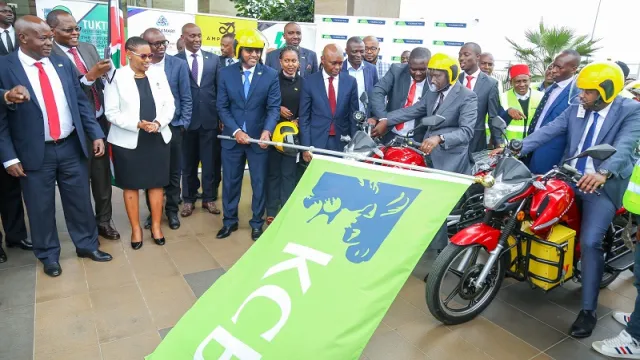KCB, UNITAR launch 100,000 e-bikes project to power green jobs

KCB, UNITAR launch 100,000 e-bikes project to power green jobs
KCB will provide financing for riders to acquire e-bikes and Tuktuks in a plan that will see 100,000 riders benefit in the next six years. This plan, which will be executed in partnership with the United Nations Institute for Training and Research (UNITAR), is expected to create over 150,000 new green jobs in the boda-boda sector.
KCB will provide green affordable loans to the riders to acquire electric bikes and tuktuks through local electric motorbikes sellers. The project was commissioned by the Cabinet Secretary, Roads and Transport Kipchumba Murkomen in Nairobi and has been rolled out in Machakos County. A plan is underway to extend it to all counties through the period.
Kenya shifting to low-carbon economy
The project is consistent with KCB Group's commitment to advancing sustainable finance and, as a result, hastening the shift to a resilient, low-carbon economy. To achieve Net Zero goal, KCB will convert 25% of its loans to green investments by 2025.
KCB Group CEO Paul Russo said: “The initiative is in line with our commitment to increasing our green lending loan portfolio by working with like-minded partners to enhance green job creation and attaining the net zero ambitions.”
“We seek to make it possible for players in the transport sector to acquire electric motorbikes at an affordable rate and earn a living. At the same time, the boda-boda riders play a key role in reducing carbon emissions in the environment, which is part of our long-term plans to conserve the environment,” Russo said.
The scheme is in line with the government's aspirations to introduce an electric vehicle public transport system. Adoption of e-vehicles is part of lowering transportation costs for all parties involved. The strategy also is in line with Kenya's plans for economic transformation and climate change.
Mr Murkomen said “The government has prioritized the adoption of e-mobility, to achieve a number of targets. There is a need to reduce carbon emissions by 32 percent by 2030. In 2022, emissions in the transport sector were estimated to be 1.26 million tonnes of carbon dioxide.”
“The adoption of electric motorbikes by boda-boda riders will help the country to achieve this target given that 1CE motorcycle emits more carbon than two saloon cars” he added.
Read aslo: KCB’s 2jiajiri plan boosts seafarers for global jobs
60 youth get e-bikes from KCB
Over 60 young boda-boda drivers from Nairobi got the first e-boda-bodas today. Earlier, the riders underwent training on e-bikes, the law, customer service, and conflict resolution techniques. The young people will also receive training in entrepreneurship and business development.
The young participants must complete training covering technical skills, capital and business management, safety, and peacebuilding. The training is part of KCB Foundation's 2jiajiri youth program in order to be eligible for the loan. They need to do this in order to be eligible for green loans from KCB microbankers.
In terms of Greenhouse Gas (GHG) emissions, the transportation industry ranks second in Kenya. Transportation is a focus sector in Kenya's National Climate Change Action Plan and expanded National Determine Contribution commitments.
In 2016, KCB introduced 2jiajiri, a programe. The initiative aims to legalize the unorganized sector and develop self-employment skills for young people and small companies. It focuses on developing youth microbusinesses in the unorganized sector so they can grow and hire more workers.
Since its inception, a total of 20,736 youth have received skills training. At the same time, the bank has disbursed over Kes246 million loans to the youth as capital and asset financing. The move has resulted in creating 64,380 direct jobs. A total of 3,402 small businesses are under incubation within the business development phase of the programme.



